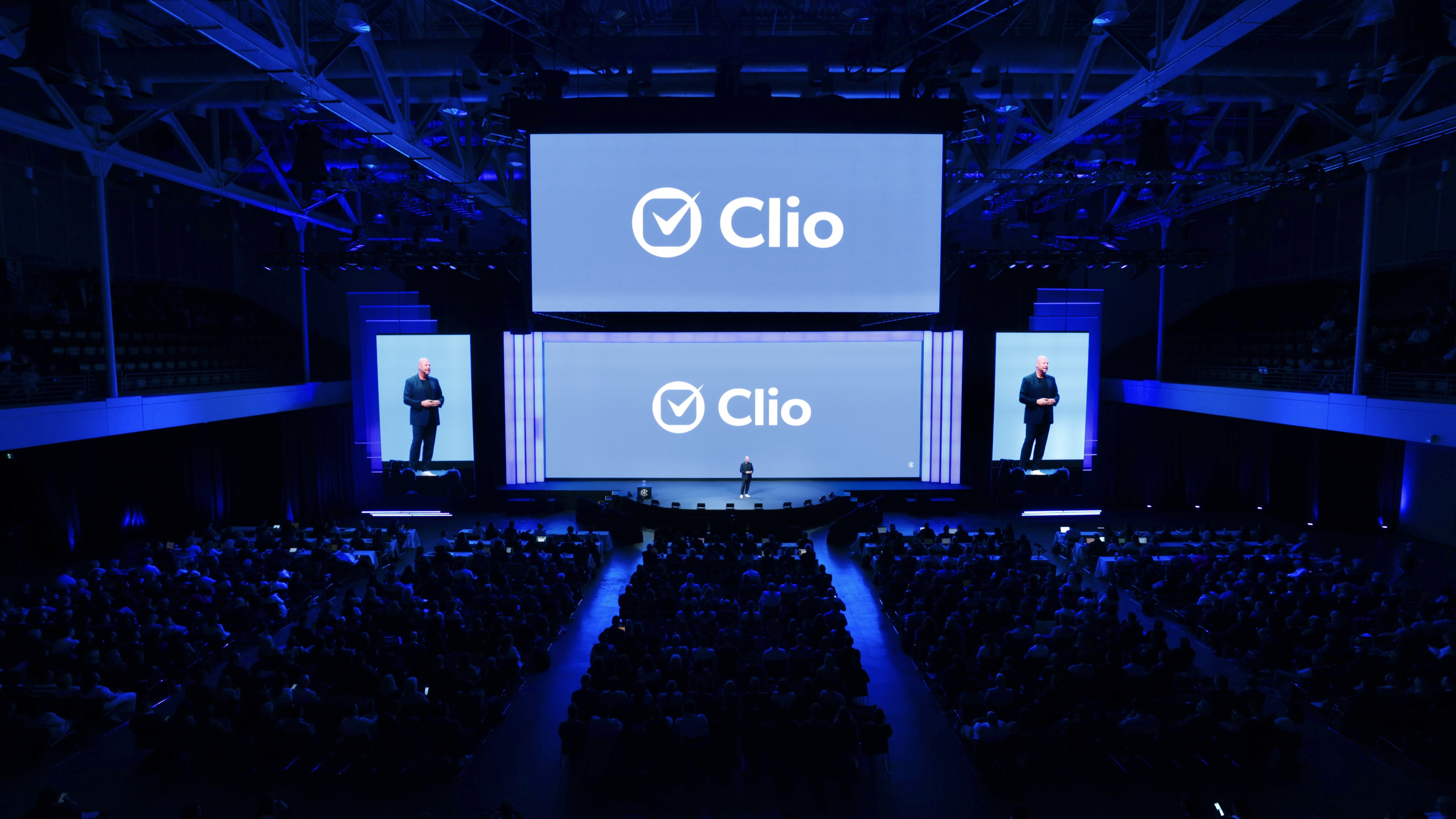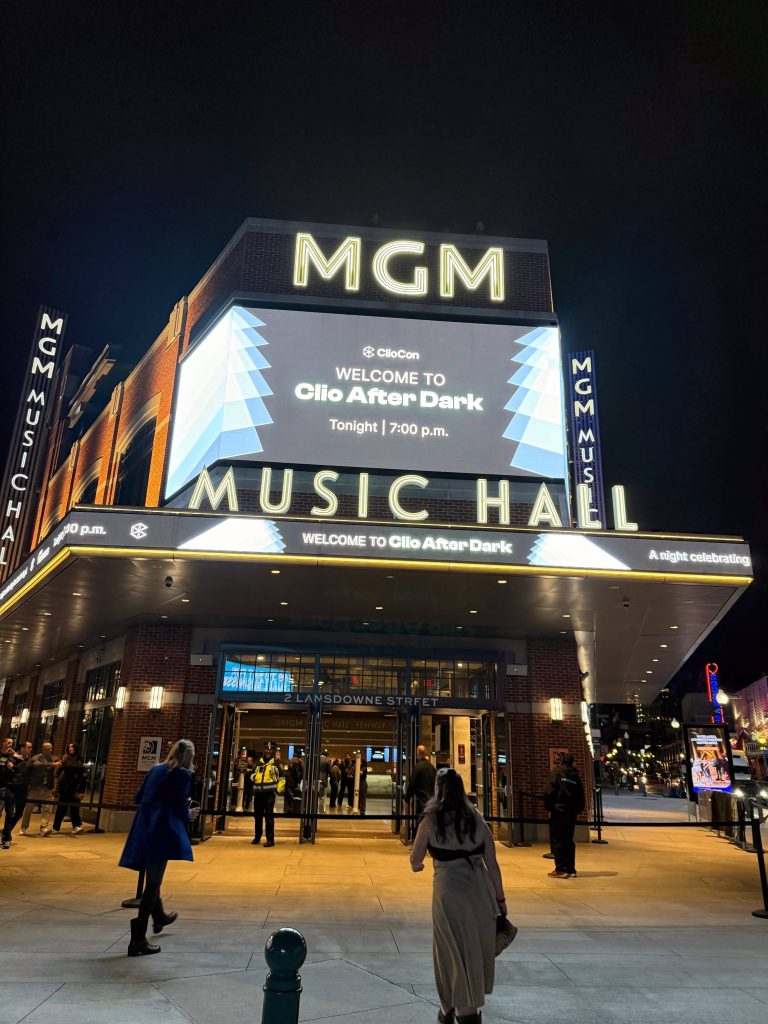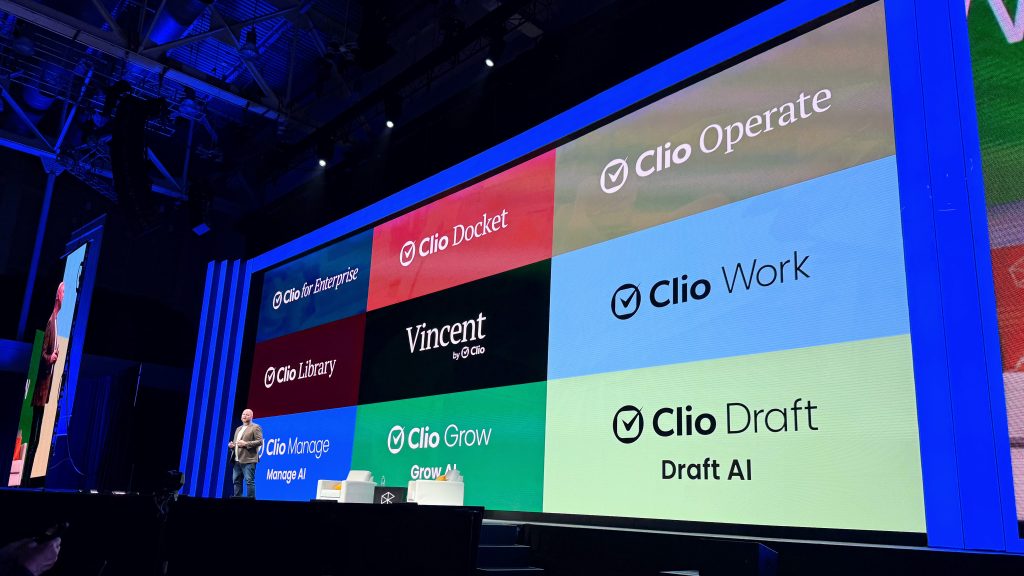Have you ever found yourself present in a moment and realized you were witnessing something historic? It is not an exaggeration to say that is what many of the 2,700 in-person attendees felt who were present for Clio cofounder and CEO Jack Newton’s keynote address that opened the 13th annual ClioCon conference last week in Boston.
Two people told me they literally teared up during his talk. Others said they felt chills down their spines. While Newton’s past keynotes have typically been punctuated by whoops and cheers as he laid out new products and features, this year’s audience was so quiet during most of the talk you could hear a pin drop. Their faces conveyed rapt attention, fixated on Newton and the giant images illustrating his words.
Afterwards, people told me they felt an array of emotions: shell-shocked, thrilled, numbed, elated, energized, frightened. So many said they needed time to process his words, to think about what it all meant for them and their practices or their companies.
Related posts:
- A Day in the Life of a Clio Lawyer, As Powered By Its New ‘Intelligent Legal Work Platform’
- Here’s A Guide To Help You Make Sense of Clio’s New Line Up of Products and Features.
Even Newton himself acknowledged this. In his remarks closing the conference the next day, he said that one consistent piece of feedback he had received was that “so many people told me they’re still processing what we announced” and that “they felt a sense of overwhelm and almost were shell shocked.”
“On one hand, I’m sorry,” Newton said. “But on the other hand, I’m also really excited by that feedback because that tells me that we delivered a lot of value and that is pretty profound.
“It does take some time to process not just how this will change your day to day and make it a little better,” he continued, “but how this technology might fundamentally rewire and rewrite how you run your law firm.”
Even I, who have covered legal tech for 30 years, who has been to every ClioCon and heard every Newton keynote, as well as the keynotes of so many other CEOs at so many other conferences, felt moved. It was a moment at which everything everyone had ever envisioned for legal tech seemed finally to be becoming tangible and real.
In fact, “becoming” is not even the right word, because much of what Newton described is already here.
‘Intelligent Legal Work Platform’
So what was going on here?
I’ll admit, to attempt to convey any of this in a news report is daunting. No doubt many of you reading this will think I have lost my mind. If I had not heard the same reaction repeated by so many who were there, I would probably agree with you. But it seemed evident to everyone in that room that we were present at an almost-tangible inflection point in the evolution of legal tech.
 This inflection point – this new chapter – is one that aims to dissolve the line between the business of law and the practice of law and to redefine how legal work itself gets done. And what is enabling this new chapter, the key that is unlocking it, the glue that is holding it all together, is generative AI.
This inflection point – this new chapter – is one that aims to dissolve the line between the business of law and the practice of law and to redefine how legal work itself gets done. And what is enabling this new chapter, the key that is unlocking it, the glue that is holding it all together, is generative AI.
Let us remember that Clio is a company that helped pioneer the cloud revolution in law when it started 17 years ago. This year’s keynote felt like a sequel of even greater magnitude: the dawn of an AI-driven, fully connected legal ecosystem that Newton called “the intelligent legal work platform.”
Simply from a product perspective, this year’s announcements – which included the launch of the new Clio Work and Clio for Enterprise and the company’s most aggressive integrations of legal AI yet – represented the most ambitious set of announcements in Clio’s history.
But beyond the products, Newton’s keynote advanced a broader vision: a legal future built not on “systems of record,” but on “systems of action.”
From Cloud Revolution to AI Reinvention
Newton began his keynote with a retrospective on Clio’s origins in 2008, when he and cofounder Rian Gauvreau introduced one of the first cloud-based legal practice-management systems at ABA Techshow. Back then, putting your practice in the cloud was a revolutionary and even heretical idea.
Seventeen years later, Clio has grown from serving solos to more than 200,000 legal professionals worldwide, dominating the small-firm practice-management market, making notable inroads on the mid-firm market, and now setting its sights on the enterprise market.
That expansion, Newton announced, would come through a new dedicated division, Clio for Enterprise, and a new suite of AI-driven tools designed for global firms and corporate legal departments.
Setting Sights On Big Law
Building on its billion-dollar acquisition of vLex (which has yet to be finalized pending approval by regulatory authorities in Spain, where vLex is headquartered) and its acquisition in March of ShareDo, Clio announced a new enterprise division of the company and the launch of a suite of products housed within that division, Clio Operate, Vincent by Clio, Clio Library and Clio Docket.
Clio Operate, built on the foundation of ShareDo, formerly a U.K.-based enterprise platform, is described as an “adaptive work-management platform” capable of connecting workflows, analytics and collaboration across global teams.
Newton called it “Clio Manage’s big brother,” a system configurable enough for 1,000-lawyer firms yet still grounded in Clio’s hallmark usability.
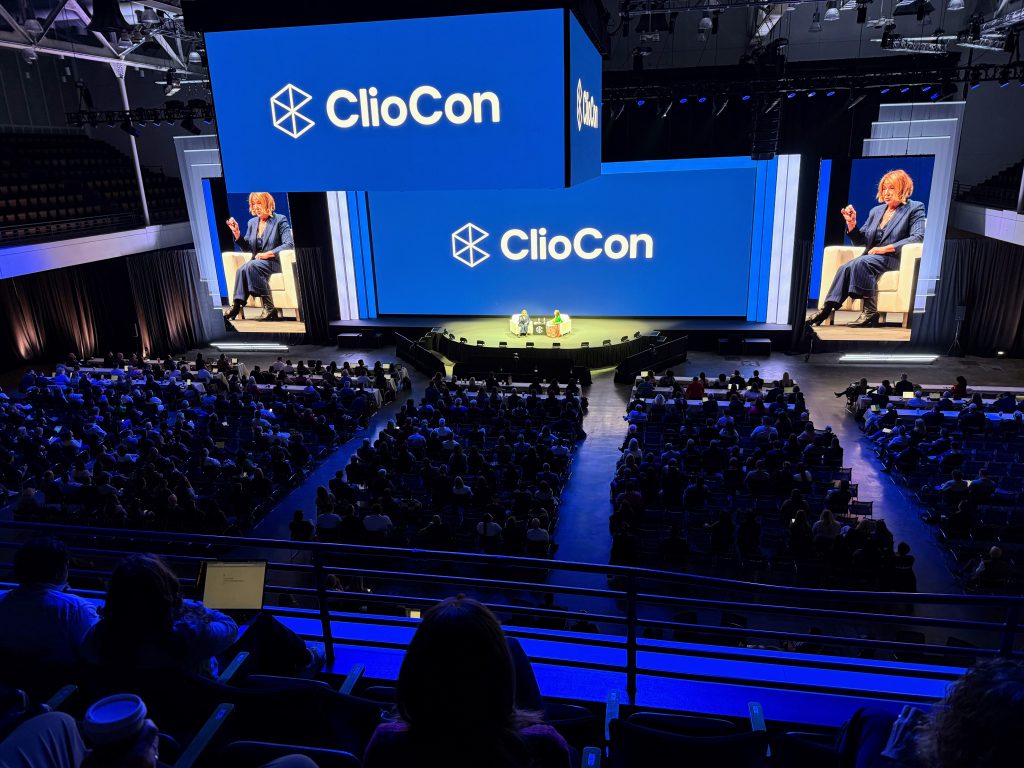
The second-morning keynote featured an interview with psychotherapist Esther Perel conducted by writer and former lawyer Gretchen Rubin.
The engine driving this enterprise suite is Vincent by Clio, the gen AI platform Clio inherited through its vLex acquisition. With vLex already deployed at eight of the world’s 10 largest firms, according to Clio, Vincent is able to deliver “enterprise-grade legal AI” grounded in a verified global legal corpus of over one billion documents spanning 110 jurisdictions.
That makes Clio one of only three companies in the world, alongside Thomson Reuters and LexisNexis, with such depth of legal data.
Newton unveiled three notable innovations built on Vincent:
- Vincent Studio, a no-code environment for lawyers to build their own AI tools.
- Vincent Drafting, which generates complex contracts from firm precedents.
- Deep Integrations with document-management systems such as iManage, NetDocuments and SharePoint.
Together, these offerings mark Clio’s most aggressive move yet into the larger-firm market, signaling a bid to compete not only on usability but on depth, data and sophisticated AI.
From System of Record to System of Action
While the enterprise announcement illustrated Clio’s market ambitions, Newton’s introduction of the concept of the Intelligent Legal Work Platform defined its philosophical ones.
For decades, he told the crowd, practice-management software has been defined by one essential role – serving as a law firm’s system of record, the place where they store everything about their practice. But in the era of AI, he said, firms need systems that do not just record what happens, but that make things happen.
As Newton framed it, Clio is now becoming a system of action that is a proactive participant in legal work, automating tasks, anticipating next steps, and converting context into outcomes.
“In a system of record, you enter a deadline,” he said. “In a system of action, AI adds it to your calendar, alerts your team, and will even draft a client update on your behalf. A system of action takes action and does work on your behalf.”
That transformation is embodied, Newton said, in a four-pronged integration of AI within Clio’s product suite:
- Clio Manage AI, automating docket extraction, billing, and client updates.
- Clio Grow AI, screening leads, running conflict checks, and scheduling consults automatically.
- Clio Draft AI, transforming firm templates into full workflows in minutes.
- Clio Work, a new workspace uniting research, drafting, and reasoning under a single AI layer.
Collectively, they form what Newton repeatedly referred to as the Intelligent Legal Work Platform, “the ecosystem for the full lifecycle of legal work – intake, scheduling, research, drafting, tracking, billing – all connected, all powered by AI.”
An AI-Native Legal Ecosystem
Central to Clio’s new product universe is Clio Work, a workspace that combines a lawyer’s matter data with the vLex legal library to deliver “research, analysis, and case strategy lawyers can rely on.”
Unlike generic AI tools that “summarize, speculate and wait for direction,” a Clio press release said, Clio Work “understands.” It integrates directly with Clio Manage to draw live data from documents, emails, and notes; cross-references that with Clio Library’s verified law; and provides precise, cited recommendations in real time.
The result is what Newton called context engineering – AI that mirrors the way lawyers think by understanding the relationships among facts, law and intent.
“Context engineering is about giving AI the same complete picture you’re carrying around in your head, so it doesn’t need to interpret text in an island, but it grasps meaning and relationships and intent, because it has all the context necessary to make the right conclusions,” he said.
“This is where our approach to AI really sets itself apart from what others in the industry are doing, because Clio already connects every piece of your practice together in a unified system of record, and we can bring all of that information to bear as context for our AI.”
Clio Work’s capabilities include drafting motions, analyzing evidence, extracting claims and timelines, and even transcribing depositions with built-in legal analysis. For transactional lawyers, it reviews contracts for risk and inconsistency and suggests negotiation strategies.
Sold as an additional product at $199 per user per month, Clio Work delivers “an entire legal intelligence suite,” Newton said, which includes Vincent AI, Clio Library and deep integration with Clio Manage.
Merging Legal Business and Practice
Perhaps the most resonant theme of the keynote was Newton’s assertion that the traditional division between software for the practice of law and the business of law is obsolete.
For 50 years, he noted, those two domains have been served by separate technologies, such as LexisNexis and Westlaw for research on the practice-of-law side, and Clio and others for practice management on the business-of-law side. AI, he argued, is now collapsing that divide.
“Through AI, we’re bringing together the practice of law and the business of law to create an entirely new category of solution for you today – a single context-aware platform where one AI understands how the pieces fit together.”
In Newton’s telling, every major milestone in technology – Microsoft’s creation of its Office suite, Google’s launch of its collaborative cloud tools, Apple’s hardware-software synergy – has been defined by convergence. Clio, he argued, is now driving that same unification in legal technology.
“This is what we saw as the opportunity to bring Clio and vLex together. We truly saw it as a one plus one equals 10 opportunity.”
Grounding AI in Legal Intelligence
A central thread in Newton’s keynote – and a central justification for Clio’s acquisition of vLex – was the differentiation between “generic” AI products as represented by foundational models such as OpenAI and Claude and what he called “legal intelligence” – AI grounded not in the open web but in reliable legal data sources such as case law and statutes.
“In legal, the performance of AI depends entirely on the quality behind its answers, and that’s why vLex is so important to Clio,” he said. Because Vincent is anchored in vLex’s 1 billion document corpus, it can achieve 3.7 times greater accuracy and a 38 percent productivity lift across key workflows, Clio claims.
That grounding, Newton argued, is not just about precision, but about trust. “Every insight Vincent provides to you,” he said, “is supported by verified citations and sources you can trust.”
Newton also framed AI as not merely an efficiency tool but as a catalyst for expanding the entire legal market.
Citing data from the World Justice Project, he noted that 77 percent of legal problems worldwide go unaddressed by lawyers. If AI-enabled lawyers can serve even a fraction of that unmet need, he argued, the total addressable market for legal services could grow from $1 trillion to $4 trillion annually.
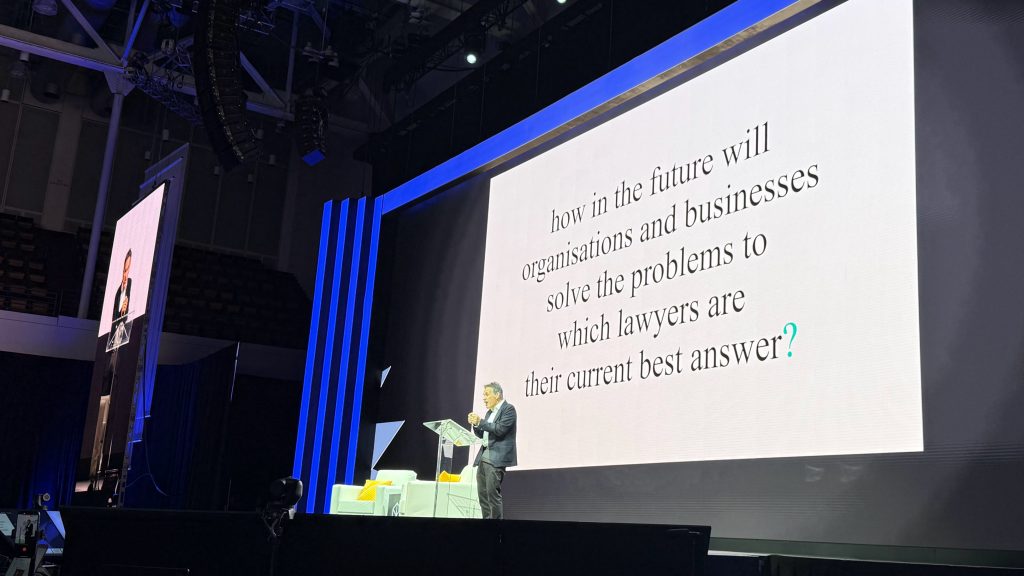
In his closing keynote, futurist Richard Susskind cautioned that lawyers may not always be the “best answer” for those with legal problems.
“AI is not here to replace legal professionals,” Newton said, “AI is here to amplify your impact.”
A Turning Point for Clio …
Over nearly 90 minutes, Newton painted a portrait of Clio not simply as a SaaS vendor, but as the nucleus of a new legal-AI infrastructure – one that spans solo practitioners, small firms, mid-sized firms, multinational firms and corporate legal departments alike.
The Clio for Enterprise launch moves the company into direct competition with entrenched enterprise providers; the Intelligent Legal Work Platform positions Clio as a potentially category-defining AI company rather than simply a practice-management tool; and Clio Work embodies the vision many have had of contextual, actionable AI for legal professionals.
In doing so, Newton seemed to be suggesting, Clio has completed its evolution from the cloud-based startup that liberated lawyers from servers to the AI-driven platform that may soon liberate them from administrative drag altogether.
… and for Legal Practice?
The philosopher and mathematician Blaise Pascal once famously said that if he had more time, he would have written a shorter letter. I feel that way about this post. But, then again, I am attempting to report a nearly 90-minute keynote and share some inkling of why it felt so impactful.
In the end, I think the reason so many in that audience were so moved or so shell-shocked is that the implications of what Newton laid out are profound. If Clio succeeds in executing on all this, it moves AI from the periphery of legal work to its core. It renders AI able to interpret, anticipate and act across every layer of a firm’s operations.
For the broader legal-tech industry, Newton’s keynote sets a new benchmark for integration and ambition. It is a direct challenge to incumbents that have yet to fuse research data, workflow automation and AI into a single cohesive experience.
And for the profession at large, Clio’s product agenda hints at a future where technology finally narrows the gap between legal demand and supply – where lawyers, armed with “context-aware” AI, can serve more clients, with higher quality, at lower cost.
“This isn’t the end of the story,” Newton concluded. “This is the beginning of a new one. Every product, every innovation, every step along the way has been leading us here to the first chapter of a new era for legal technology, a chapter that will redefine how legal work gets done.”
Although I have written this story about a specific keynote given by a specific CEO of a specific legal tech company, I truly believe that what happened last week was not just about one man or one company.
It was about a moment in history that signified something happening on a far-broader scale – a turning point for the entire legal profession and for everyone whom that profession serves – and everyone it should be serving but is not.
 Robert Ambrogi Blog
Robert Ambrogi Blog